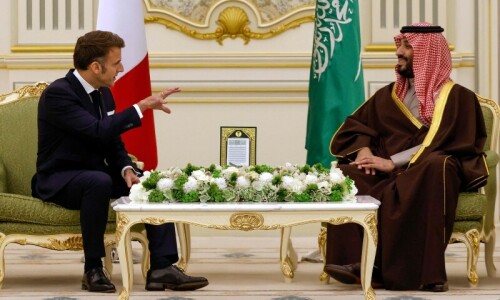ON Thursday, Prime Minister Shehbaz Sharif avoided a public showdown with the PPP — a key ally whose support he must retain to keep the minority PML-N government in power — by rescinding the contentious appointment of retired bureaucrat Zafar Mahmood as the new Irsa chairman. However, it remains unclear if he moved with such speed just to appease the PPP, or whether his advisers had realised the ‘illegality’ of one of his administration’s first major acts.
It appears that the appointment was made under a controversial ordinance seeking to restructure Irsa. The ordinance became infructuous as former president Arif Alvi had refused to sign it, as it could have caused friction between the centre and provinces.
The ordinance, prepared by the caretaker government towards the end of its tenure, in breach of its mandate and without consulting the provinces or the CCI, had suggested substantive changes in the ‘federal structure’ of the water regulator, which monitors the distribution of Indus waters among the provinces in accordance with the Water Apportionment Accord,1991.
The ordinance aimed to revise Irsa’s composition, vest its chairman with vast powers, and cut the provinces’ role in its decision-making functions. The chairman was empowered to also review and settle provincial grievances, rendering Irsa members ineffective. Currently, the Irsa chairmanship rotates among the four provincial members, and the authority’s decisions on water issues are made based on majority votes.
Since these proposals allow the PM to exercise a lot of power on Irsa through its chairman and the federal government and effectively have complete control on the authority’s decision-making functions, the ordinance had drawn wide opposition from the Sindh caretaker cabinet and experts.
At a time when certain centralist forces are touting the reversal of the landmark 18th Amendment and curtailment of the provincial share of federal taxes under the NFC award as the solution to Pakistan’s economic and political problems, the attempt to ‘centralise’ Irsa and reduce the provincial role in decision-making could exacerbate centre-province and interprovincial disharmony.
Besides, the message Islamabad tried to send to the smaller provinces by appointing a strong proponent of Kalabagh as Irsa’s head was unmistakable.
In this context, nobody can fault PPP’s Naveed Qamar for calling out the PM for his “very serious, illegal and unconstitutional” order to, intentionally or unintentionally, attempt to use the infructuous ordinance to “usurp” the rights of the provinces through the appointment of the Irsa chief. “On the very first day, if we start encroaching upon the rights of the provinces, how do we function as a federation?” he asked.
While making consequential decisions like this, Mr Sharif should not forget that ill-advised actions can have very serious ramifications for the federation, even if these suit his own party’s politics.
Published in Dawn, March 15th, 2024













































Dear visitor, the comments section is undergoing an overhaul and will return soon.